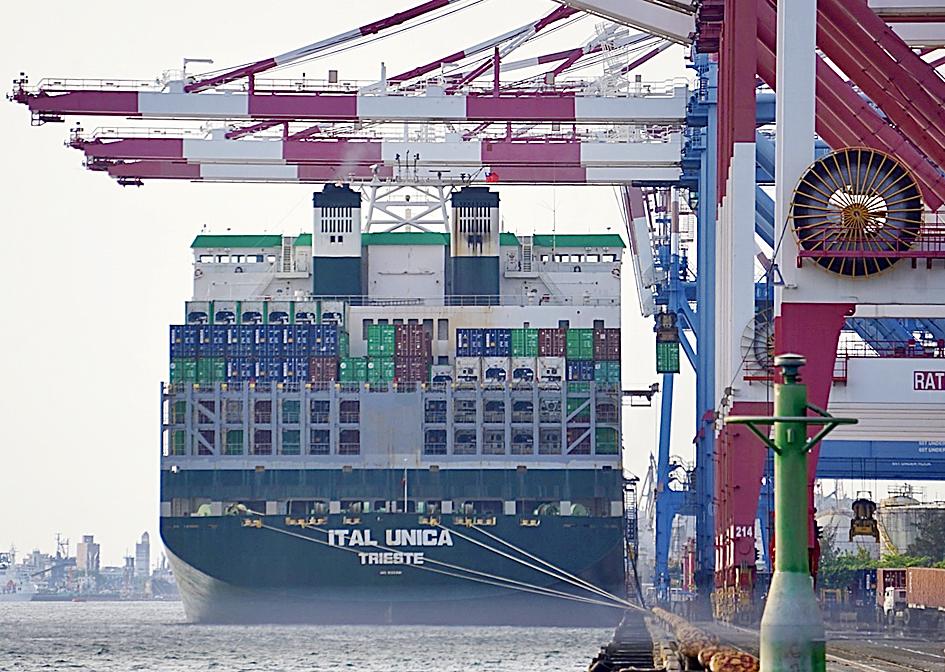Taiwan’s exports last month climbed 18.8 percent year-on-year to a third record high of US$41.46 billion, backed by high demand for electronics used in digital transformation and innovative technology applications, the Ministry of Finance said yesterday.
The demand could also see outbound shipments rise to a new high this month with growth of 12 to 16 percent, Department of Statistics Director-General Beatrice Tsai (蔡美娜) said, adding that exports in May usually fare stronger than in April.
“Global demand for chips has not shown any sign of cooling thus far, while selling prices for non-tech products stayed high, accounting for robust export showings,” Tsai told an online news conference in Taipei.

Photo: CNA
Shipments to major trade partners were overall higher, although they lost some momentum due to an economic slowdown in China because of the country’s strict COVID-19 prevention measures, she said.
Exports logged positive cyclical movements in the past 22 months and are moving steadily toward beating the 26-month expansionary cycle seen between November 2010 and December 2012, Tsai said.
Shipments of electronics, mainly semiconductors, spiked 27.5 percent to US$17.21 billion, driven by demand for chips used in smartphones, high-performance computers, laptops and vehicles, a ministry report said.
Exports of information and communication technology products put up a relatively lackluster 10.2 percent increase to US$5.19 billion, as US demand for servers remained sturdy, while demand was more subdued in China and ASEAN markets, Tsai said.
The slowdown could likely be attributed to lockdowns in major Chinese cities, and merits close monitoring, she said.
The retreat is most evident in exports of optical products, which declined 15.6 percent to US$918 million, she added.
Non-tech product categories turned out mostly healthy with year-on-year advances of 4 percent to 60 percent, partly because international fuel prices pushed up selling prices, Tsai said.
Plastic products were the only exception, with a 2.1 percent slip to US$2.37 billion, the report said.
Meanwhile, imports soared 26.7 percent to US$36.55 billion, as agricultural and industrial materials, capital equipment and consumer products posted double-percentage point improvements, the report said.
China’s lockdowns not only affected Taiwan’s exports, but also weighed on imports, Tsai said, as material and component shortages could worsen.
The latest trade data gave Taiwan a trade surplus of US$4.91 billion, shrinking 19 percent from a year earlier owing partly to a strong US dollar.
For the first four months of the year, exports gained 22.3 percent year-on-year to US$162.4 billion, while imports rose 26 percent to US$142 billion, the ministry said.

ADVANCED: Previously, Taiwanese chip companies were restricted from building overseas fabs with technology less than two generations behind domestic factories Taiwan Semiconductor Manufacturing Co (TSMC, 台積電), a major chip supplier to Nvidia Corp, would no longer be restricted from investing in next-generation 2-nanometer chip production in the US, the Ministry of Economic Affairs said yesterday. However, the ministry added that the world’s biggest contract chipmaker would not be making any reckless decisions, given the weight of its up to US$30 billion investment. To safeguard Taiwan’s chip technology advantages, the government has barred local chipmakers from making chips using more advanced technologies at their overseas factories, in China particularly. Chipmakers were previously only allowed to produce chips using less advanced technologies, specifically

BRAVE NEW WORLD: Nvidia believes that AI would fuel a new industrial revolution and would ‘do whatever we can’ to guide US AI policy, CEO Jensen Huang said Nvidia Corp cofounder and chief executive officer Jensen Huang (黃仁勳) on Tuesday said he is ready to meet US president-elect Donald Trump and offer his help to the incoming administration. “I’d be delighted to go see him and congratulate him, and do whatever we can to make this administration succeed,” Huang said in an interview with Bloomberg Television, adding that he has not been invited to visit Trump’s home base at Mar-a-Lago in Florida yet. As head of the world’s most valuable chipmaker, Huang has an opportunity to help steer the administration’s artificial intelligence (AI) policy at a moment of rapid change.

TARIFF SURGE: The strong performance could be attributed to the growing artificial intelligence device market and mass orders ahead of potential US tariffs, analysts said The combined revenue of companies listed on the Taiwan Stock Exchange and the Taipei Exchange for the whole of last year totaled NT$44.66 trillion (US$1.35 trillion), up 12.8 percent year-on-year and hit a record high, data compiled by investment consulting firm CMoney showed on Saturday. The result came after listed firms reported a 23.92 percent annual increase in combined revenue for last month at NT$4.1 trillion, the second-highest for the month of December on record, and posted a 15.63 percent rise in combined revenue for the December quarter at NT$12.25 billion, the highest quarterly figure ever, the data showed. Analysts attributed the

Taiwan Semiconductor Manufacturing Co’s (TSMC, 台積電) quarterly sales topped estimates, reinforcing investor hopes that the torrid pace of artificial intelligence (AI) hardware spending would extend into this year. The go-to chipmaker for Nvidia Corp and Apple Inc reported a 39 percent rise in December-quarter revenue to NT$868.5 billion (US$26.35 billion), based on calculations from monthly disclosures. That compared with an average estimate of NT$854.7 billion. The strong showing from Taiwan’s largest company bolsters expectations that big tech companies from Alphabet Inc to Microsoft Corp would continue to build and upgrade datacenters at a rapid clip to propel AI development. Growth accelerated for